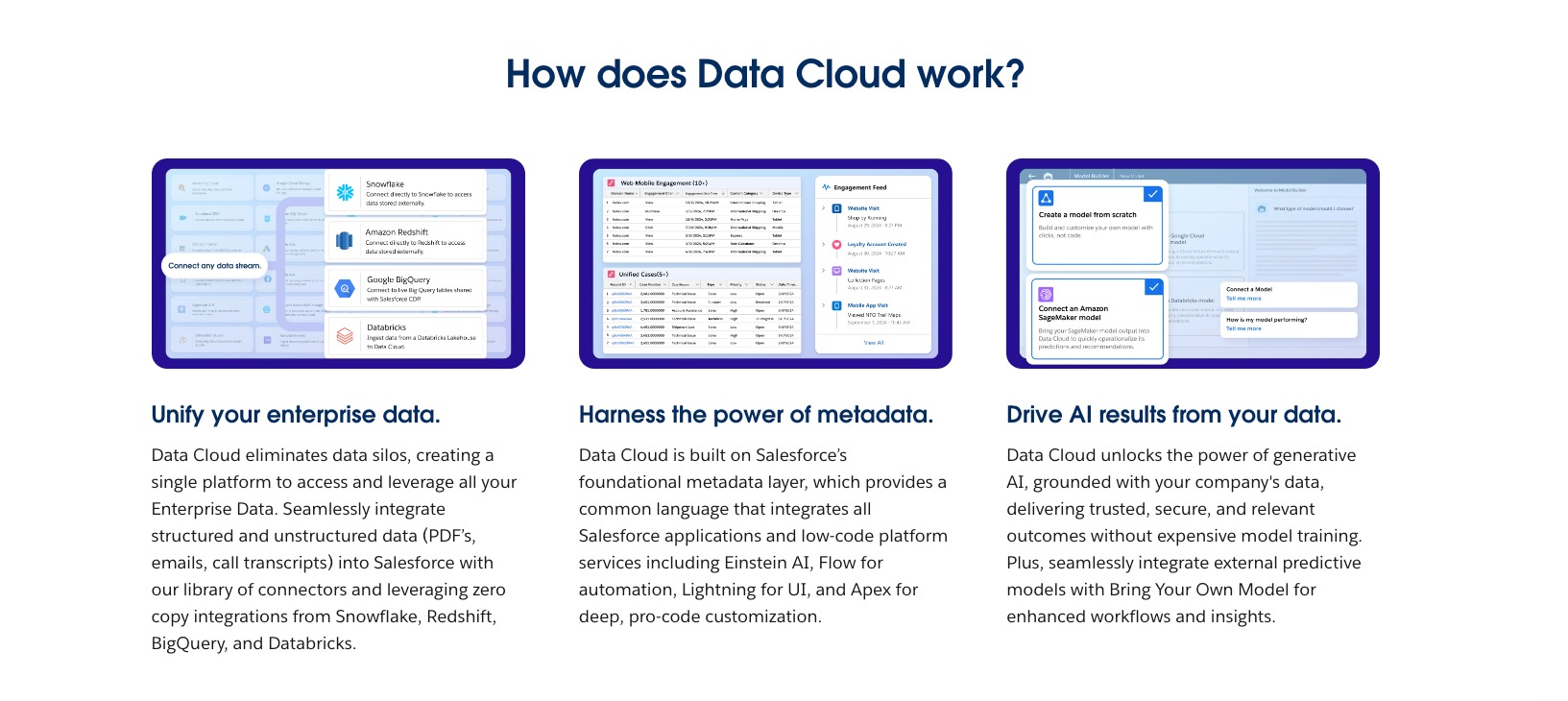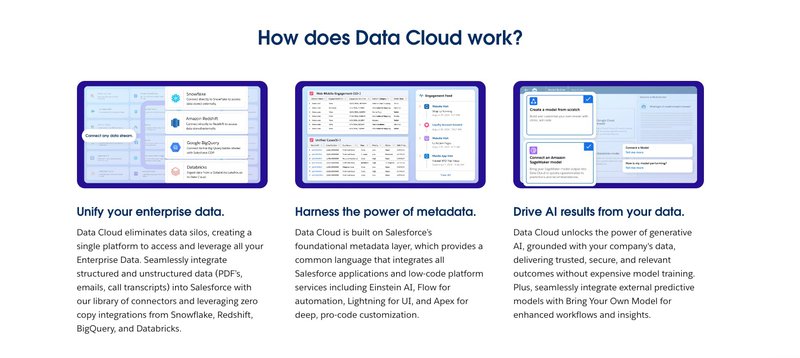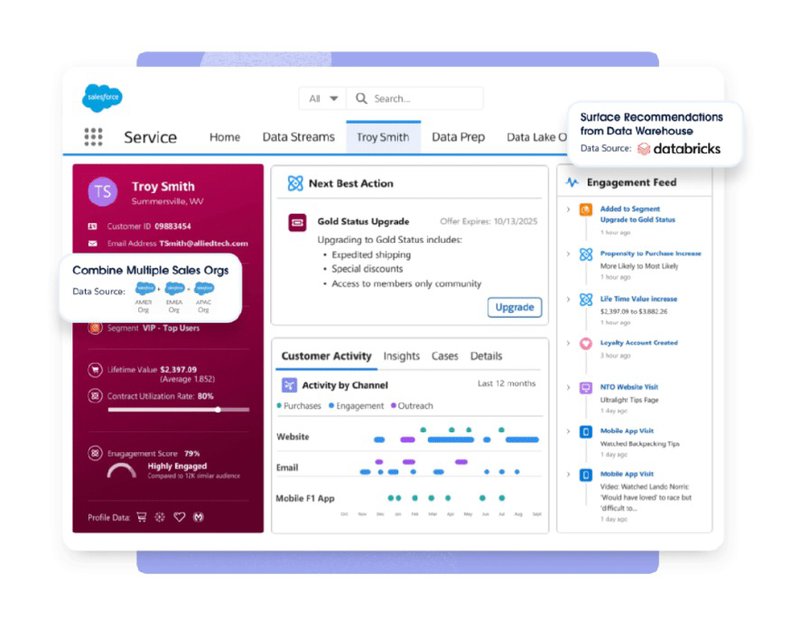Unifying Financial Data with Salesforce Data Cloud: You Can Get Started for Free

In today's fast-paced, data-driven world, financial services companies are constantly seeking ways to gain a competitive edge. One key strategy is leveraging the power of unified data to drive insights, personalize customer experiences, and fuel growth. Salesforce Data Cloud is a game-changer in this regard, enabling financial institutions to harmonize their data from various sources and unlock its full potential. It was recently recognized by Gartner as a leader based on its Data Cloud offering in their Inaugural 2024 Magic Quadrant for Customer Data Platforms report. The best part? You can get started with Data Cloud for free. In this blog post, we'll explore the benefits of using Data Cloud in financial services, how it integrates with common supporting technologies in the industry, and how you can start your data unification journey at no cost.

The Benefits of Harmonizing Data with Data Cloud in Financial Services
- 360-Degree Customer View: By unifying data from various sources such as core banking systems, payment processors, and credit bureaus, Data Cloud provides a comprehensive, 360-degree view of your customers. This allows you to better understand their needs, preferences, and behaviors, enabling you to deliver personalized experiences that drive loyalty and revenue.
- Improved Fraud Detection: Financial institutions can leverage Data Cloud to analyze massive amounts of data from various sources to detect potentially suspicious or fraudulent activity. By integrating with fraud detection systems, Data Cloud can help identify and address issues before they cause damage.
- Enhanced Compliance: The financial industry is subject to numerous data, security, and privacy regulations. Data Cloud follows strict requirements for data privacy and security, ensuring your data storage method keeps your customers' data secure and providing multiple layers of protection against cyber threats. This helps financial institutions maintain compliance with industry regulations.
- Greater Scalability: Cloud services are scalable, meaning banks and other financial institutions have the flexibility to scale up and down as needed. If your organization sees spikes in data volume at different times of the year, you can increase and decrease your computing capacity automatically as demand fluctuates. This optimizes your operations and prevents over-allocation of resources.

Integrating Data Cloud with Common Supporting Technologies in Financial Services
- Core Banking Systems: By integrating Data Cloud with core banking systems, financial institutions can unify customer data across various products and services, such as checking accounts, savings accounts, loans, and credit cards. This enables a holistic view of the customer relationship and facilitates cross-selling and upselling opportunities.
- Payment Processors: Integrating Data Cloud with payment processors allows financial institutions to gain insights into customer spending habits and preferences. This data can be used to personalize offers, rewards, and loyalty programs, driving customer engagement and retention.
- Credit Bureaus: By integrating Data Cloud with credit bureaus, financial institutions can access a wealth of data on customer creditworthiness and risk profiles. This information can be used to make more informed lending decisions, reduce risk, and improve overall portfolio performance.
- Fraud Detection Systems: Integrating Data Cloud with fraud detection systems enables financial institutions to analyze vast amounts of data from multiple sources to identify potential fraud. By leveraging machine learning and AI capabilities, Data Cloud can help detect anomalies and suspicious patterns in real time, reducing the risk of financial losses due to fraudulent activity.
Getting Started with Data Cloud for Free
Salesforce is offering no-cost access to Data Cloud for certain Sales Cloud and Service Cloud customers (Enterprise or Unlimited editions). This includes 250,000 Data Services Credits to help you get started on your data unification journey. Here's how you can take advantage of this offer:
- Evaluate Your Data Strategy: Assess your current data management practices and develop a clear plan for what data to ingest and how to organize it. This will ensure a solid foundation for your Data Cloud implementation.
- Activate Data Cloud: Reach out to your Salesforce account executive or customer success manager to activate your no-cost access to Data Cloud and claim your 250,000 free Data Services Credits.
- Implement Use Cases: Begin with foundational use cases such as unifying customer data across multiple systems or integrating with fraud detection tools. These use cases are ideal for demonstrating the value of Data Cloud and gaining organizational buy-in.
- Understand Credit Consumption: Data Services Credits are consumed based on the complexity and volume of data processed. For example, querying data costs two (2) credits per million records, while batch-transforming a million rows costs 2,000 credits. Plan your credit consumption accordingly.
Here's an example of credit consumption: Let's say a bank wants to unify 50 million customer records across its core banking system, payment processor, and credit bureau. Ingesting this data via batch processing would consume approximately 100,000 credits (50 million rows * 2,000 credits / 1 million rows). With the 250,000 free credits, you can easily cover this use case and more.
Conclusion
Salesforce Data Cloud is a powerful tool for financial services companies looking to harmonize their data and unlock valuable insights. By integrating with common supporting technologies in the industry, such as core banking systems, payment processors, credit bureaus, and fraud detection systems, Data Cloud enables financial institutions to gain a 360-degree view of their customers, improve fraud detection, enhance compliance, and achieve greater scalability. With the ability to drive personalized experiences, reduce risk, and optimize operations, Data Cloud is a must-have for any financial services organization seeking to thrive in today's data-driven landscape.
Want to learn more?




